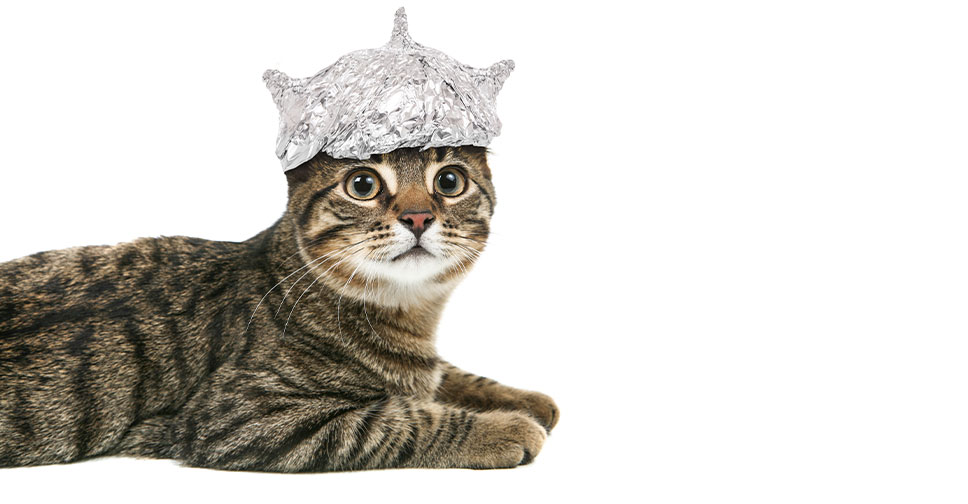
Aging & Cognitive Dysfunction in Cats - How To Help
Did you know the oldest cat in the world lived to be over 38? Like dogs and other pets, cats’ cognition can deteriorate over the years. However, recognising that your cat is struggling more than usual as they age, you can make some small adjustments to improve their cognitive function and potentially lengthen their life.
In this article we will discuss the signs of Cognitive Dysfunction and what you as a caring pet owner can do to help your cat as they age.
What Is Cognitive Dysfunction Syndrome?
Cognitive dysfunction syndrome is the decline of mental capacities, including memory, learning, and focus. Also known as senility and dementia, cognitive dysfunction means a brain deterioration that challenges your cat’s normal everyday functions.
For example, your older cat might become confused and forget where their litter box is, or even where they are in the house causing unwelcome anxiety and distress.
What Are The Signs Of Cognitive Dysfunction?
With the lifespan of cats being longer than ever, understanding the illness and monitoring your cat for common signs of cognitive dysfunction is vital if you are going to support them through cognitive dysfunction.
- Senior cats often become disorientated and confused by their surroundings and time, resulting in a diversion from their regular routine.
- Another consequence is that your cat will become more prone to urinating outside of the litter box due to being confused by their space and routine.
- Sleep cycles in older cats can also change, choosing to sleep when they are normally awake, even if their owners are around.
- Sometimes, behaviours in geriatric cats change with age, and they begin to react differently towards their owners, either more aggressively or more affectionate.
- Aging cats’ interest in food can also be affected, usually they become less interested in eating their food, leading to unhealthy weight loss.
- As their memory and learning fade, older cats can become irritable, anxious, less responsive, groom themselves less, or become more vocal.
- Funny as it sounds, your elderly cat may be overly interested or entirely disinterested in playing with you and running around the house.
Often, older cats experience a cognitive decline due to other medical conditions such as dental disease and chronic kidney disease. If you start to notice any of these symptoms in your cat, book them an appointment with your local veterinarian. Health checks can provide you with the proper diagnosis and treatment to give the best care for your cat.
Why Is My Cat Losing Weight?
It’s rare for healthy cats to lose weight randomly, so something isn’t quite right if you notice that your pet is looking a bit slimmer without intent. There are numerous age-related causes for weight loss in older cats that can be addressed to help return your cat to a healthier life.
One way is to rearrange your cat’s things like litter boxes and bowls as they may be struggling to reach their bowl and missing meals. These simple changes will provide easier access for your cat so they can eat more regularly to help prevent unnecessary weight loss.
It is also normal for your aging cat to lose interest in food, in this case consider changing their diet and trialing new foods to see if they gain greater enjoyment from a new taste. Just like us, cats are more likely to eat tasty rather than bland food, so if your cat has lost interest in its food maybe try mix it up with a fresh meal for them.
How Can I Help My Cat's Symptoms?
While cognitive dysfunction cannot be cured, you can make changes to your cat’s life that can significantly help and reduce their cognitive decline. By altering the environment, nutrition, and veterinary medicine in your cat’s life, your cat can live a relatively normal and happy life.
Diet
A simple way for cat owners to help their aging cats is to provide them with better nutrition. By altering their diet, you can significantly reduce the symptoms of aging and help your cat live an easier life. Adding antioxidants and vitamin E to your cat’s diet will work wonders as they are known to support brain function.
Drugs
Cognitive dysfunction syndrome is a relatively new illness becoming more apparent as cats live longer. As a result, there are no officially licensed treatment options to reduce the symptoms of age. For now, many veterinarians are using anti-anxiety and anti-depressant medications to treat the signs of cognitive deterioration.
Each veterinarian will take a different approach, but ultimately, there are still many advancements to be made in veterinary medicine to support older cats with the symptoms of aging.
Environment
It may sound simple but small changes to your cat’s environment can have a huge impact for their wellbeing. By providing more stimulation in the home, cat owners can enrich their cat’s environment and boost their cat’s brain function.
By slowly introducing more toys to the home and playing with them more regularly, you cat will mentally engage helping to prevent the deterioration of their brain.
We highly recommend purchasing puzzle feeders as they require your cat to make their way through the puzzle to get to the ‘prize’ – a tasty treat. Various feeders offer different levels of difficulty, but they all stimulate their brains while encouraging them to eat simultaneously: a win-win!
As always, if you are concerned about your cat book in an appointment with your local veterinarian.
